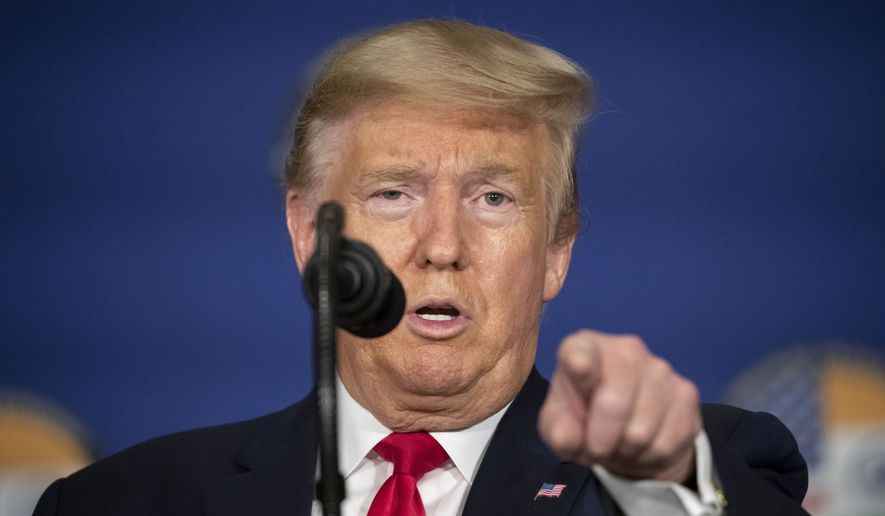President Trump’s long-running war with the “failing” New York Times intensified Wednesday when his reelection campaign sued the news organization for libel, seeking millions in damages for allegedly publishing false information about a conspiracy with Russia.
The president said of his libel suit Wednesday night, “There’ll be more coming.”
The eight-page complaint, filed in the New York State Supreme Court, seeks to hold The Times accountable for an opinion column by former editor Max Frankel that asserted the campaign had “an overarching deal” with Russia to “help the campaign against Hillary Clinton” in return for U.S. policies that would be friendlier to Moscow and provide relief from economic sanctions. The article appeared March 27, 2019.
The lawsuit further accuses The Times of harboring “extreme bias against and animosity toward” the president’s campaign and claims it sought to influence the presidential election in November while publishing defamatory accusations “at the very least … with reckless disregard for the truth.”
It further alleges that The Times “has engaged in a systematic pattern of bias against the campaign, designed to maliciously interfere with and damage its reputation and seek to cause the organization to fail.”
Taking on the paper known as the flagship of the liberal media in the U.S. is sure to find favor with the president’s conservative base. The complaint also accuses The Times of favoring Democrats almost exclusively for more than a half-century, noting its chronic failure to endorse GOP presidential candidates.
“There is extensive evidence that The Times is extremely biased against the campaign, and against Republicans in general,” the complaint stated. “This evidence includes, among other things, the fact that The Times has endorsed the Democrat in every United States presidential election of the past 60 years.
Mr. Frankel’s article appeared under the headline “The Real Trump-Russia Quid Pro Quo.” In it, he wrote that “Collusion — or a lack of it — turns out to have been the rhetorical trap that ensnared President Trump’s pursuers.”
“There was no need for detailed electoral collusion between the Trump campaign and Vladimir Putin’s oligarchy because they had an overarching deal: the quid of help in the campaign against Hillary Clinton for the quo of a new pro-Russian foreign policy, starting with relief from the Obama administration’s burdensome economic sanctions,” he wrote. “The Trumpites knew about the quid and held out the prospect of the quo.”
Jenna Ellis, senior legal adviser to the campaign, said those statements “were and are 100 percent false and defamatory.”
“The complaint alleges The Times was aware of the falsity at the time it published them, but did so for the intentional purpose of hurting the campaign, while misleading its own readers in the process,” she said.
The lawsuit says the Trump campaign can prove “actual malice” by the Times. That’s a relatively difficult legal standard to prove, in which the plaintiff must show that a defendant published a false statement when the defendant either knew it was false, or showed a “reckless disregard” for the truth.
The Times said in a statement, “The Trump campaign has turned to the courts to try to punish an opinion writer for having an opinion they find unacceptable. Fortunately, the law protects the right of Americans to express their judgments and conclusions, especially about events of public importance. We look forward to vindicating that right in this case.”
The lawsuit notes that Mr. Frankel’s article was published just a few weeks before special counsel Robert Mueller issued his final report that found no collusion between Moscow and the Trump 2016 campaign. It says the paper knew “the Mueller Report was likely to exonerate the campaign” when the article appeared.
More importantly, the lawsuit stated, The Times had shown through its own reporting that the Russia allegations were false before Mr. Frankel’s article was published.
“The Times’ own previous reporting had confirmed the falsity of these statements,” the complaint said. “But The Times published these statements anyway, knowing them to be false, and knowing it would misinform and mislead its own readers, because of The Times’ extreme bias against and animosity toward the campaign, and The Times’ exuberance to improperly influence the presidential election in November 2020.”
Sen. Bernard Sanders of Vermont, the front-runner for the Democratic presidential nomination, criticized the president for the lawsuit.
“Trump has called the press the ’enemy of the people,’ and now — taking a page from his dictator friends around the world — is trying to dismantle the right to a free press in the First Amendment by suing The New York Times for publishing an opinion column about his dangerous relationship with Russia,” Mr. Sanders said.
• Dave Boyer can be reached at dboyer@washingtontimes.com.




Please read our comment policy before commenting.